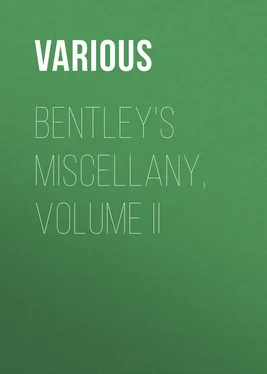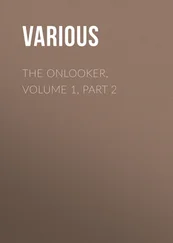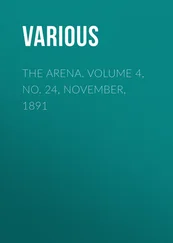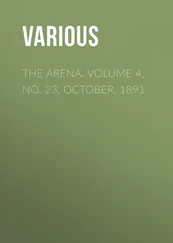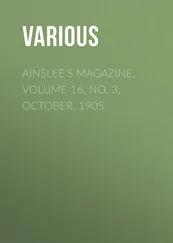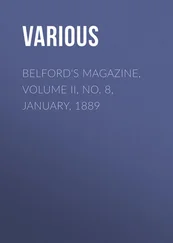Various - Bentley's Miscellany, Volume II
Здесь есть возможность читать онлайн «Various - Bentley's Miscellany, Volume II» — ознакомительный отрывок электронной книги совершенно бесплатно, а после прочтения отрывка купить полную версию. В некоторых случаях можно слушать аудио, скачать через торрент в формате fb2 и присутствует краткое содержание. Издательство: Иностранный паблик, Жанр: foreign_antique, foreign_prose, на английском языке. Описание произведения, (предисловие) а так же отзывы посетителей доступны на портале библиотеки ЛибКат.
- Название:Bentley's Miscellany, Volume II
- Автор:
- Издательство:Иностранный паблик
- Жанр:
- Год:неизвестен
- ISBN:нет данных
- Рейтинг книги:3 / 5. Голосов: 1
-
Избранное:Добавить в избранное
- Отзывы:
-
Ваша оценка:
- 60
- 1
- 2
- 3
- 4
- 5
Bentley's Miscellany, Volume II: краткое содержание, описание и аннотация
Предлагаем к чтению аннотацию, описание, краткое содержание или предисловие (зависит от того, что написал сам автор книги «Bentley's Miscellany, Volume II»). Если вы не нашли необходимую информацию о книге — напишите в комментариях, мы постараемся отыскать её.
Bentley's Miscellany, Volume II — читать онлайн ознакомительный отрывок
Ниже представлен текст книги, разбитый по страницам. Система сохранения места последней прочитанной страницы, позволяет с удобством читать онлайн бесплатно книгу «Bentley's Miscellany, Volume II», без необходимости каждый раз заново искать на чём Вы остановились. Поставьте закладку, и сможете в любой момент перейти на страницу, на которой закончили чтение.
Интервал:
Закладка:
"What!" said the sahib najib, "when you see the constitution in danger, do not you perceive that it will endanger the happiness of the people whose cause you advocate?"
"I do not see that it is in danger," said the other. "If my boat is sinking because we carry too much sail, shall I not trim my sails and inspect my ballast?"
"But by trimming your boat you would throw all your cargo overboard, and thus lose all you have," answered the other.
This part of the conversation I understood, and then I said, "I now understand: when a camel is overladen, and cannot proceed, on account of the weight of his burthen, either the camel will die, or I must lighten his burthen."
"Very good," said the rough man, who now for the first time cast the shadow of his condescension over me. "You are the lord of quick understanding, and see things."
"But," said his well-dressed antagonist, "I neither agree that the boat is badly trimmed, or that the camel is overladen: " then, turning to me, he said, "Surely, sir, you, who have been bred and born a Mussulman, who have let your beard grow according to old-established custom, who have washed your hands and feet in accordance to the precepts of your law, – you would not change all at once, because some new sect in your country were to arise and say, 'Cut off your beard, cease to wash, pray in a new manner, and say to Mahomet, You are a false prophet;' you could not in your conscience do so."
" Astafarallah! " said I, blowing over my shoulders at the same time, "am I mad to eat such a profusion of abomination!"
"You are a man of perfection," said he. "I am sure the more you see of my country and get acquainted with its present condition, the more you will agree with me."
I looked towards my friend Jān Pûl, who hitherto had not uttered a word, and said, "This sahib says nothing. Perhaps owing to his saying less than we do, he may be the lord of more wisdom than all our heads put together."
"What can I say," said Jān calmly, "when there is much to be said on both sides? The highest wisdom is to gather experience from the past, and apply it to the necessities of the future."
"Agreed," said the rough man: "we must therefore reform."
"Agreed," said the smooth man: "reform is useless."
I immediately perceived how the matter stood, and, with that penetration for which all Persians are famous, I discovered the true state of the whole country. I saw that the people were divided into two sects, as much opposed to each other as Jews are to true believers; that plain sense had as little chance in the controversy as a sober man may have in the brawls of two drunkards; and that, before things get straight, each of the drunkards must be sobered by breaking their shins in stumbling over a stone, or their heads by carrying them too high.
CHAPTER VIII
We continued to drive onwards: the faster we went, the more the infidels argued. I sat in my corner guessing my way through their words, and already making up in my mind the sort of letter which I should write to the Asylum of the Universe upon the state of this extraordinary country, whilst my silent friend, with his hook-stick and close-buttoned coat, shut his eyes and slumbered; only occasionally giving signs of life. At length we arrived at a house which I supposed might be a caravanserai, after the Franc fashion, open to true believers, for, on looking up I saw painted upon a board an elephant with a castle upon its back. I began to think this might be in compliment to me, seeing that elephants are part of the state of Persian monarchs: but I was mistaken, because, instead of taking any notice of me, the sahib najib, on the contrary, did not show his usual civility; but, putting his head out of the window, he asked one of the bystanders, "Is there any news astir?"
"Nothing particular," said an unconcerned infidel; "nothing. The papers say, 'A man threw a stone and has broken the king's head!'"
"There," said the smooth man to the rough, "there, that comes of your reform!"
"I deny that," said the other: "on the contrary, it comes of your no-reform."
"Why, surely," answered the sahib najib, "if you had not taught the people not to respect their king, to despise his nobles, and to laugh at the laws, such an atrocity never would have happened."
"No, indeed, it never would," retorted the other, "if you had made such changes that the people would love their king, respect his nobles, and be satisfied with the laws."
"Then you think stoning your king a right thing to do?" said one.
"Then you allow making him odious," answered the other, "is what ought to be done?"
"Will a stone get up and throw itself?"
"Will a man complain unless he be aggrieved?"
"Hallo! my friend," said the sahib najib to the bystander, "what is said about this atrocious act, eh?"
"Why, some say, 'Poor king!' others say, 'Poor stone!'" answered the bystander in the coolest manner possible.
At this I began truly to have an insight into things, and could not help exclaiming in the bottom of my gullet, " Allah Allah, il Allah! There is but one Allah!"
"You understood what that man said?" said Jān Pûl to me, with a sigh, and in a low voice.
" Belli , yes," said I, "wonderful! The men of this country are lions without saints. Allah! Allah! to throw a stone at the king, and no executioner by, to cut the wretch's head off."
"No, no," said he, "that must be proved; first, whether it was a stone; second, whether it was a man who threw it; and, third, whether it hit the king's head, or some other head."
" Aman, aman! Mercy, mercy!" I exclaimed; "let me return to Persia. If so little is said about breaking the king's head, where shall I turn for justice if some one cuts off my ears? Well may the people want reform!"
"I will just prove to you, sir," said the soft infidel, "that this case just proves that we want no reform."
"How!" said I, "break your king's head, and nobody to mend it!"
"That is not the case," said he. "If a people have so much security from the laws, that not even the poorest wretch, even for a crime of such magnitude, can be condemned without proof against him and a full trial, surely they cannot complain: they are all equal in the eye of the law, and more they cannot want." He said this in great exultation, having obtained, as he conceived, a complete triumph over his adversary, and eyed him with appropriate scorn.
The rough man looked as if his head went round and round, and as if he were come to a full stop; but, pulling up the two ends of his shirt, – I suppose to show that he had one, – he said, "If the people have one good law, is that a reason why they should not have more? The great man may get his head broke, – he is rich and mighty, a little salve cures him, and he is as rich and happy as ever; but the poor man who has broken it, save the satisfaction of making a good throw, he remains as poor and miserable as ever."
"Then, sir," said the sahib najib, "you would have what can never be, – you would have perfect equality amongst mankind?"
"Yes, truly," exclaimed the other; "because, if all were equal, there would be no heads broken, and no stones thrown."
This, too, I understood, and said, "What words are these? All men cannot be kings, nor can they all be viziers, nor all khans. I, who know nothing of your extraordinary customs, I can understand that. Were I to think of being anything but what I am, might not my neighbour think so too; and if I wished to be him, and he me, why, then the world would soon be upside down, and from one end of the universe to the other there would be nothing but clutching of beards, and cries of justice, and no justice!"
"Whatever you may say," said the rough infidel, "we must have more equality in our country than we have at present, or else the world will turn upside down. The rich must be poorer, and the poor richer."
Читать дальшеИнтервал:
Закладка:
Похожие книги на «Bentley's Miscellany, Volume II»
Представляем Вашему вниманию похожие книги на «Bentley's Miscellany, Volume II» списком для выбора. Мы отобрали схожую по названию и смыслу литературу в надежде предоставить читателям больше вариантов отыскать новые, интересные, ещё непрочитанные произведения.
Обсуждение, отзывы о книге «Bentley's Miscellany, Volume II» и просто собственные мнения читателей. Оставьте ваши комментарии, напишите, что Вы думаете о произведении, его смысле или главных героях. Укажите что конкретно понравилось, а что нет, и почему Вы так считаете.
